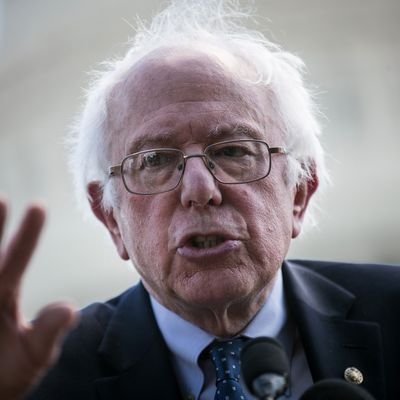
The sight of 15 Senate Democrats, including many of the party’s likely presidential contenders, co-sponsoring Bernie Sanders’s single-payer health-care bill may look like a momentous step. “What that means,” writes Jake Tapper, “is that with the notable exception of former Vice President Joe Biden, every top tier(ish) 2020 Democrat is now on board with a policy proposal that Clinton said less than two years ago would ‘never, ever come to pass.’”
But this image of progress only holds true if you imagine the process as a series of continuous steps. In reality, single payer has always been, and remains, a political dilemma that nobody has been able to resolve, and there is no evidence the resolution has grown any easier. What looks like a large step forward is actually a party edging closer to a cliff it has no intention of going over.
The barrier to single payer is that the American health-care system has been built, by accident, around employer-based insurance. The rhetoric of single payer concentrates its moral emphasis on people who lack insurance at all. (“Do we, as a nation, join the rest of the industrialized world and guarantee comprehensive health care to every person as a human right?” writes Sanders today.) But the barrier to single-payer health care is the people who already have coverage. Designing a single-payer system means not only covering the uninsured, but financing the cost of moving the 155 million Americans who have employer-based insurance onto Medicare.
That is not a detail to be worked out. It is the entire problem. The impossibility of this barrier is why Lyndon Johnson gave up on trying to pass a universal health-care bill and instead confined his legislation to the elderly (who mostly did not get insurance through employers), and why Barack Obama left the employer-based system intact and created alternate coverage for non-elderly people outside it.
In theory, the transition could be done without hurting anybody. The money workers and their employers pay to insurance companies would be converted into taxes. But this means solving two enormous political obstacles. First, most people who have employer-based coverage like it and don’t want to change. Second, higher taxes are unpopular. Yes, in an imaginary, rational world, people could be reassured that Medicare will be as good as what they have, and the taxes will merely replace the premiums they’re already paying. In reality, people are deeply loss-averse and distrustful of politicians.
Health-care experts have spent decades trying to grapple with this dilemma. Sanders has not come even a single inch closer to resolving it. Instead he hand-waves the problem away.
Asked by Vox about the difficulty of switching people out of employer-based insurance, he scoffs, “It’s not a question of switching plans,” and then segues into a generalized riff about the merits of universal insurance. (In real politics, you can’t answer people’s concerns by denying they’re concerns.) Asked by the Washington Post about the taxes needed to finance his plan, he insists that we have no idea how much it would cost because the only studies so far have been faked by big pharma and the insurance industry: “The truth is, embarrassingly, that on this enormously important issue, there has not been the kind of research and study that we need. You’ve got think tanks, in many cases funded by the drug companies and the insurance companies, telling us how terribly expensive it’s going to be.”
The bill does not contain any tax increases, leaving those to a separate piece of legislation. A nonspecific health-care plan that lacks a plausible financing system has accomplished approximately zero percent of the necessary work, as the Republicans discovered this year.
There is nothing in Sanders’s rhetoric that indicates he even recognizes the shape of the political problem. Instead he employs the classic populist technique of imagining the people as a whole standing united around an obvious solution, and only the machinations of an invidious elite can thwart them. Here is what he tells Vox:
“What this struggle is about really, honestly, is not a health care debate. Should health care be guaranteed to all people? Most people say yes. Are we wasting an enormous amount of money in the current system? Most people would say yes. Can we take on the drug companies and the insurance companies and Wall Street and their unlimited sums of money to influence Congress? … That’s a major political struggle that we have to engage in.”
And here is what he writes in his New York Times op-ed:
Needless to say, there will be huge opposition to this legislation from the powerful special interests that profit from the current wasteful system. The insurance companies, the drug companies and Wall Street will undoubtedly devote a lot of money to lobbying, campaign contributions and television ads to defeat this proposal.
Evil corporations are the only impediment he acknowledges. At no point does he grant that the most important source of opposition will come from actual American voters concerned about losing their current plan or paying higher taxes.
There are ways around the problem. Mostly they involve boring, incremental reforms that fall well short of a real single-payer plan: lowering the age at which people can buy in to Medicare, creating a public plan on the exchanges, perhaps creating ways to encourage employers to cover their workforce through Medicare or a public plan.
Sanders is not a details person, though. He prefers to act as though the important barrier is the abstract notion of government-run insurance, turning every question about specifics into a question about values. But the concept of a government-financed insurance program has never been the controversial part. (This is why single-payer Medicare is a beloved institution Republicans swear up and down never to change, while privatized Obamacare is a detested socialist monstrosity.) The controversial part has always been the mechanics of change.
Obama himself said many times that, if he were starting a health-care system from scratch, he would prefer a single-payer system. Sanders’s single-payer bill is vague enough that the Democrats co-sponsoring it are really doing nothing more than saying the same thing Obama did: A single-payer plan would be nice, in a world that looks nothing like the one we inhabit.






























